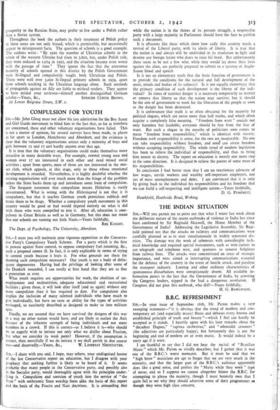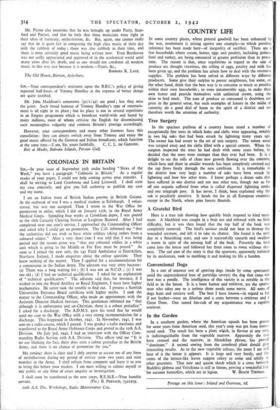B.B.C. REFRESHMENT
SIR,—In your issue of September i8th, Mr. Picton makes a very sweeping statement—" it is obvious that the trend of modern and con- temporary art (and especially music) flouts and debases every known and established principle of truth and beauty "—which I feel can hardly be accepted as it stands. I heartily agree with his later remarks about the " decadent Dagoes," " tapioca orchestras," and " adenoidal crooners " (the adjectives are particularly happy), but fortunately this is not the beginning and end of modern art or even music. It would indeed be a sorry age if it were.
I am thankful to say that I did not hear the recital of " Brazilian Music " which Mr. Picton so vividly describes, but I gather that it was one of the B.B.C.'s worst moments. But it must be said that we " high brow " musicians are apt to forget that we are very much in the minority, and that the larger part of the B.B.C.'s audience apparently does like a good noise, and prefers the "Music while they work " type of noise; and so I suppose we cannot altogether blame the B.B.C. for attempting to please the majority, though I must honestly own that I quite fail to -see why they should advertise some of their programmes as though they were high class concerts. Mr. Picton also mentions that he was brought up under Parry, Stan- ford and Parratt, and that he feels that these musicians were right in their ideas of harmony, orchestration, &c. But, again, one cannot really say that he is quite fair in comparing the high class music of their day with the rubbish of today ; there was also rubbish in their time, and there is most certainly good music being written now. Even Beethoven was not really appreciated and approved of in the academical world until many years after his death, and so one should not condemn all modern music in this way just because it is modern.—Yours, &c., The Old House, Bierton, Aylesbury.
BARBARA K. LANE.



























 Previous page
Previous page